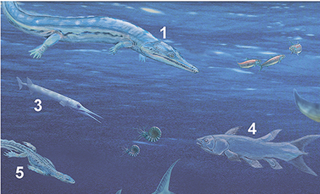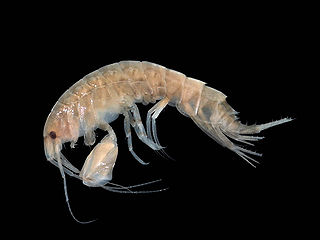
The Devonian is a geologic period and system of the Paleozoic, spanning 60 million years from the end of the Silurian, 419.2 million years ago (Mya), to the beginning of the Carboniferous, 358.9 Mya. It is named after Devon, England, where rocks from this period were first studied.

Paleontology, also spelled palaeontology or palæontology, is the scientific study of life that existed prior to, and sometimes including, the start of the Holocene Epoch. It includes the study of fossils to classify organisms and study interactions with each other and their environments. Paleontological observations have been documented as far back as the 5th century BCE. The science became established in the 18th century as a result of Georges Cuvier's work on comparative anatomy, and developed rapidly in the 19th century. The term itself originates from Greek παλαιός, palaios, "old, ancient", ὄν, on, "being, creature", and λόγος, logos, "speech, thought, study".

A four-minute mile is the completion of a mile run (1.6 km) in four minutes or less. It was first achieved in 1954 by Roger Bannister, at age 25, in 3:59.4. The "four-minute barrier" has since been broken by over 1,400 male athletes, and is now the standard of all male professional middle distance runners in cultures that use Imperial units. In the 65 years since, the mile record has been lowered by almost 17 seconds, and currently stands at 3:43.13, by Hicham El Guerrouj of Morocco, at age 24, in 1999. Running a mile in four minutes translates to a speed of 15 miles per hour (24 km/h).

The gastropods, commonly known as snails and slugs, belong to a large taxonomic class of invertebrates within the phylum Mollusca called Gastropoda.

Baleen whales, also known as whalebone whales, form a parvorder of the infraorder Cetacea. They are a widely distributed and diverse parvorder of carnivorous marine mammals. Mysticeti comprise the families Balaenidae, Balaenopteridae (rorquals), Cetotheriidae, and Eschrichtiidae. There are currently 15 species of baleen whales. While cetaceans were historically thought to have descended from mesonychids,, molecular evidence supports them as a clade of even-toed ungulates (Artiodactyla). Baleen whales split from toothed whales (Odontoceti) around 34 million years ago.

Anza-Borrego Desert State Park (ABDSP) is a California State Park located within the Colorado Desert of southern California, United States. The park takes its name from 18th century Spanish explorer Juan Bautista de Anza and borrego, a Spanish word for sheep. With 585,930 acres (237,120 ha) that includes one-fifth of San Diego County, it is the largest state park in California.

Balaena is a genus of cetacean (whale) in the family Balaenidae. Balaena is considered a monotypic genus, as it has only a single extant species, the bowhead whale. It was named in 1758 by Linnaeus, who at the time considered all of the right whales as a single species. Historically, both the family Balaenidae and genus Balaena were known by the common name, "right whales", however Balaena are now known as bowhead whales.

Trevor Gordon Bannister was an English actor best known for having played the womanising junior salesman Mr Lucas in the sitcom Are You Being Served? from 1972 to 1979, and for his role as Toby Mulberry Smith in the long-running sitcom Last of the Summer Wine, from 2003 until it ended its run in 2010.

Agathaumas is a dubious genus of a large ceratopsid dinosaur that lived in Wyoming during the Late Cretaceous. The name comes from the Greek αγαν agan – "much" – and θαυμα thauma – "wonder". It is estimated to have been 9 metres (30 ft) long and weighed 6 tonnes, and was seen as the largest land animal known at the time of its discovery.

Brian Patrick Bannister is an American former professional baseball starting pitcher, currently in a front-office position with the San Francisco Giants. He played for the New York Mets and Kansas City Royals of Major League Baseball (MLB) from 2006 through 2010. He previously served as assistant pitching coach and vice president of pitching development for the Boston Red Sox.

Bannister Mall was a shopping mall in the southeast corner of Kansas City, Missouri opened on August 6, 1980. After nearly 27 years of operation, the mall closed on May 31, 2007. It was originally anchored by Macy's, JCPenney, The Jones Store, and Sears.

Aphaneramma is an extinct genus of temnospondyl amphibian. It lived during the Early Triassic epoch. Fossils have been found in the Mianwali Formation of Pakistan, Madagascar, the Zhitkov Formation of Russia, and the Kongressfjellet Formation of Svalbard (Norway). Aphaneramma grew up to 2 metres (6.6 ft) long, with a 23 centimetres (9.1 in) skull. Aphaneramma's jaws were very long, similar to the gharial's, and lined with small teeth. This adaptation suggests it may have preyed on fish. A marine lifestyle for this animal was proposed. Aphaneramma is closely related to Cosgriffius from North America,

Alan Bannister is a retired professional baseball player who played in the major leagues for the Philadelphia Phillies (1974–75), Chicago White Sox (1976–80), Cleveland Indians (1980–83), Houston Astros (1984) and Texas Rangers (1984–85). Originally a shortstop, he was a utility player during his major league career.

The history of paleontology traces the history of the effort to understand the history of life on Earth by studying the fossil record left behind by living organisms. Since it is concerned with understanding living organisms of the past, paleontology can be considered to be a field of biology, but its historical development has been closely tied to geology and the effort to understand the history of Earth itself.

Marine invertebrates are the invertebrates that live in marine habitats. Invertebrate is a blanket term that includes all animals apart from the vertebrate members of the chordate phylum. Invertebrates lack a vertebral column, and some have evolved a shell or a hard exoskeleton. As on land and in the air, marine invertebrates have a large variety of body plans, and have been categorised into over 30 phyla. They make up most of the macroscopic life in the oceans.

Wantzosaurus was a genus of temnospondyl amphibian of the Trematosauridae family. Fossils have been found in the Early Triassic Middle Sakamena Formation of what is now Madagascar. It showed adaptations for an almost completely aquatic lifestyle, having the ability to swim by lateral undulation. A pelagic lifestyle for this animal has been proposed.

Crustaceans form a large, diverse arthropod taxon which includes such animals as crabs, lobsters, crayfish, shrimps, prawns, krill, woodlice, and barnacles. The crustacean group can be treated as a subphylum under the clade Mandibulata; because of recent molecular studies it is now well accepted that the crustacean group is paraphyletic, and comprises all animals in the clade Pancrustacea other than hexapods. Some crustaceans are more closely related to insects and other hexapods than they are to certain other crustaceans.
Bannister is an unincorporated community in Camden County, in the U.S. state of Missouri.

Female Fugitive is a 1938 American drama film, directed by William Nigh. The film stars Evelyn Venable, Craig Reynolds, and Reed Hadley. It was released on April 15, 1938.
Caveasphaera is a multicellular organism found in 609-million-year-old rocks in the Guizhou Province of South China, that is not easily defined as an animal or non-animal. The organism is notable due to the study of related embryonic fossils which display different stages of its development: from early single-cell stages to later multicellular stages. Such fossil studies present the earliest evidence of an essential step in animal evolution - the ability to develop distinct tissue layers and organs. According to researchers, fossil studies of Caveaspaera have suggested that animal-like embryonic development arose much earlier than the oldest clearly defined animal fossils. and may be consistent with studies suggesting that animal evolution may have begun about 750 million years ago. Nonetheless, Caveasphaera fossils may look similar to starfish and coral embryos. Still, researchers have concluded, "Parental investment in the embryonic development of Caveasphaera and co-occurring Tianzhushania and Spiralicellula, as well as delayed onset of later development, may reflect an adaptation to the heterogeneous nature of the early Ediacaran nearshore marine environments in which early animals evolved."

















